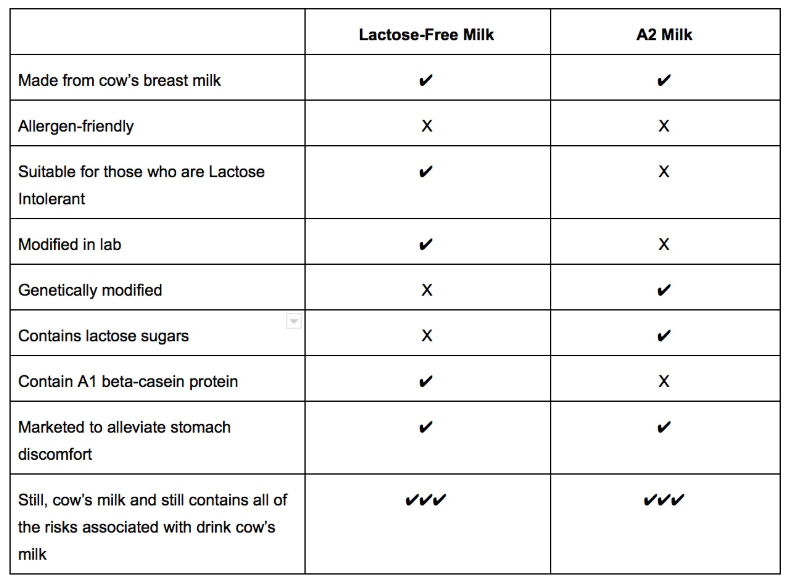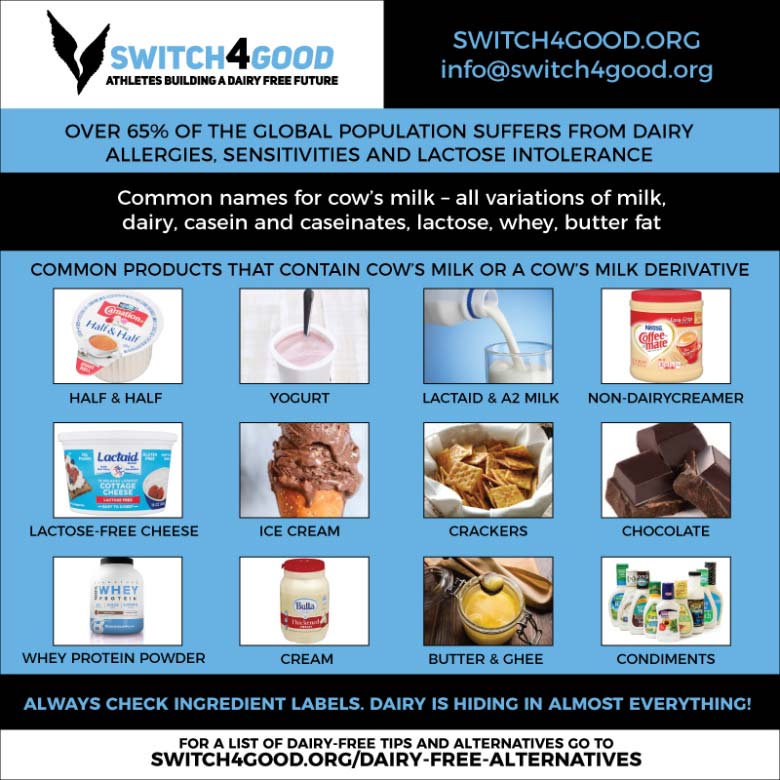

A2 milk is milk from mother dairy cows that have been bred to not produce the A1 beta-casein protein, a form of the casein protein in milk. This type of cow’s milk exists because producers of A2 milk claim that this A1 protein causes stomach discomfort and bloating. However, this claim is not backed by sound research. On the a2 Milk® Company website, the company may reference “published research,” but it doesn’t actually provide any links to this research for their consumers to view.
A2 cow’s milk still contains the A2 beta-casein protein and whey protein. If someone with a dairy allergy were to ingest either of these proteins, their body will elicit an immune response, causing an allergic reaction, and making A2 milk an unacceptable and dangerous alternative. Even the a2 Milk® Company admits that their milk is not safe for those who are allergic to cow’s milk.
Not sure if you have a dairy allergy? Learn about the 4 Unexpected Signs You May be Allergic to Dairy by one of Switch4Good’s experts, Dr. Vivian Chen. You might be surprised by some of the delayed and discreet symptoms such as respiratory problems, joint pain, weight gain, and more. In addition to not being suitable for dairy allergy sufferers, A2 milk may also cause side effects for those who are lactose intolerant—the same population this milk is marketed toward. While A2 milk does not contain the A1 protein (thanks to selective breeding), it does contain lactose sugars. Those with lactose intolerance (a whopping 65% of the world population) cannot properly digest these sugars, resulting in equally uncomfortable symptoms. A2 milk is looking a lot like “regular” cows milk—it’s just a marketing scheme.
What is lactose-free milk? Is it different than a2 milk?
Lactose-free milk and A2 milk somewhat different but promote the same marketing message: consumers can “enjoy” their dairy without annoying stomach discomfort. Lactose-free milk focuses solely on the elimination of lactose sugars but still retains all of the casein and whey proteins. A2 milk focuses solely on eliminating the A1 beta-casein protein while retaining the A2 beta-casein protein, whey protein, and lactose sugar.
Sixty-five percent of the global population is lactose intolerant, which presents a major issue to the dairy industry. Lactose-free milk is the industry’s response. To make cow’s milk more digestible to this large demographic, producers add a lactase enzyme (the same enzyme that is missing from those who are lactose intolerant) to the milk. Adding this enzyme causes a breakdown of the lactose sugars, preventing whole, intact sugars from being absorbed by the body.
In addition to not being suitable for dairy allergy sufferers, A2 milk may also cause side effects for those who are lactose intolerant.
As we age, the activity of our lactase enzyme, the enzyme that breaks down lactose, begins to decrease. If we are not properly breaking down these lactose sugars, they will get absorbed by the colon fully intact, causing an array of gastrointestinal symptoms such as gas, bloating, and diarrhea. Learn more about lactose intolerance from a Switch4Good expert.
Lactose-free milk still contains cow’s milk proteins, including A1 beta-casein, A2 beta-casein, and whey protein, making it unsafe for those with a dairy allergy to consume.
Wondering if you may be lactose intolerant? Take our Lactose Intolerant Quiz.

Are either of these alternatives healthy for those without an allergy or those who aren’t lactose intolerant?
While A2 milk and lactose-free milk producers market themselves as a safe alternative for those who do not want to give up their favorite dairy products, these beverages are still cow’s milk. Aside from allergies and intolerances, all forms of cow’s milk contain trans fats, saturated fats, a multitude of growth and sex hormones, cholesterol, and sugar, all of which were specifically formulated to help a calf grow into a 2,000 lbs animal. When humans consume this milk made for baby cows, these “ingredients” can increase their risk of acne, diabetes, osteoporosis, bone fractures, heart disease, asthma, weight gain, chronic inflammation, and cancer.
To learn more about the potential health risks associated with dairy consumption, visit Switch4Good’s Why Avoid Dairy page.
While modified milks may alleviate some gastrointestinal discomfort, one must ask themselves if they really want to be drinking something that requires so much modification before it can be safe for immediate consumption. With so many allergen-free and naturally lactose-free brands of plant milk, there’s no need to skip that cup or coffee or forgo your morning cereal.
Of course, it’s not just glasses of cow’s milk that can cause discomfort. Cow’s milk is found in a variety of common kitchen staples, somewhat in part due to massive government marketing campaigns. Learn more about the dairy industry’s strong influence in the government, and see below for an idea of just how many foods contain dairy.

Copyright 2026 Center for Nutrition Studies. All rights reserved.
Deepen Your Knowledge With Our
Plant-Based Nutrition
Certificate
Plant-Based Nutrition Certificate
- 23,000+ students
- 100% online, learn at your own pace
- No prerequisites
- Continuing education credits






